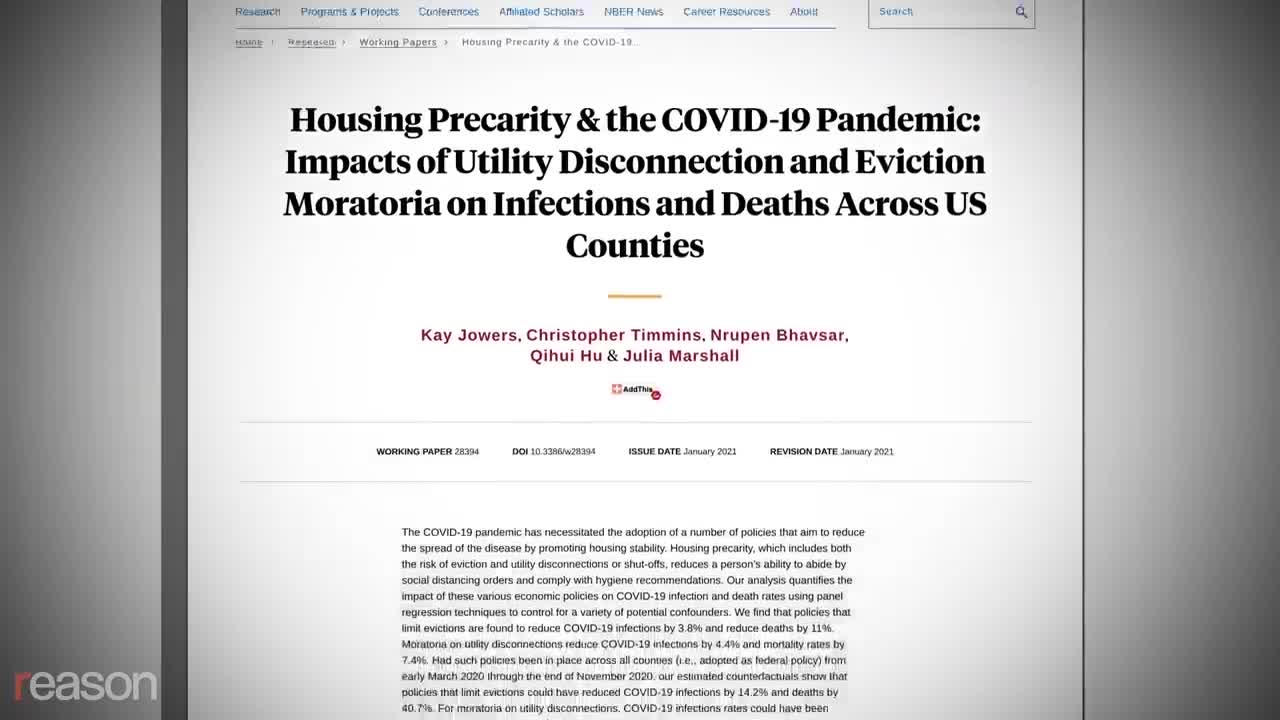Premium Only Content

The Deeply Flawed Studies Behind the Eviction Moratoriums
The government and media relied on studies plagued by shoddy statistics to make the case for blocking evictions during the COVID-19 pandemic.
For full text, links, and more, go to: https://reason.com/video/2021/07/01/t...
------------------
Subscribe to our YouTube channel: https://www.youtube.com/ReasonTV?sub_...
Like us on Facebook: https://www.facebook.com/Reason.Magaz...
Follow us on Twitter: https://twitter.com/reason
Reason is the planet's leading source of news, politics, and culture from a libertarian perspective. Go to reason.com for a point of view you won't get from legacy media and old left-right opinion magazines.
----------------
On September 4, 2020, the Centers for Disease Control and Prevention (CDC) halted residential evictions in the United States for nonpayment of rent due to the COVID-19 pandemic. Many states and municipalities got there first, imposing at least partial eviction moratoriums starting in March and April of 2020. The theory behind these emergency orders was that if Americans were forced to leave their homes and move into more crowded settings, it would increase transmission of COVID-19.
The federal ban was supposed to expire at the end of 2020. Then it was extended a month, then two more months, then through the end of June, and then last week, the CDC extended it again until the end of July. Many states and cities have also extended their moratoriums—in some cases through the end of September, even as COVID-19 infection and death rates are plummeting.
Were the eviction bans necessary to protect public health during the pandemic? Two studies that got widespread media attention, and that have been cited by the federal government to support its policies, claim to show that the moratoriums saved thousands of lives.
"Researchers estimated that the lifting of moratoriums could have resulted in between 365,200 and 502,200 excess coronavirus cases and between 8,900 and 12,500 excess deaths," noted NPR, in an interview with postdoctoral researcher Kathryn Leifheit of UCLA's Fielding School of Public Health.
Leifheit was the lead author of "Expiring Eviction Moratoriums and COVID-19 Incidence and Mortality," a study cited by the CDC in its order extending the federal moratorium. (Leifheit didn't respond to Reason's interview request.)
The second study, which also makes dramatic claims about the eviction moratoriums, was authored by a team of researchers at Duke University. It got widespread media attention and was cited twice by the Consumer Financial Protection Bureau (CFPB) in the federal register as justification for its rulemaking.
These studies are deeply flawed. Their underlying data are incomplete and inconsistent. Their results are implausible. The size of the effect is wildly disproportionate to other public health interventions. The researchers also claim an absurd amount of certainty in their results despite the large uncertainties in the data they use, and they assert a causal effect based solely on correlation.
If the authors were correct, they would have arrived at one of the greatest public health discoveries in history. It took over a year and perhaps $100 billion to reduce COVID-19 rates by 40 percent with vaccinations; the Duke researchers claim that if a universal eviction moratorium had been implemented six months earlier, it could have reduced death rates by over 40 percent. Researchers have struggled to demonstrate the benefits of masks, social distancing, and lockdowns with high levels of certainty. Yet these eviction moratorium researchers find high confidence for a gigantic immediate effect from a legal change affecting a tiny subset of the population.
Finally, the authors of the Duke study declined to share their dataset with Reason for scrutiny on the grounds that it hasn't yet been published in a peer-reviewed journal, which not only raises additional red flags but is a violation of basic research ethics—particularly in the case of a study that's been widely reported on in the media and is cited by a government agency as justification for federal policies.
Produced and edited by Justin Monticello. Written by Monticello and Aaron Brown. Graphics by Isaac Reese. Audio production by Ian Keyser.
Music: Aerial Cliff by Michele Nobler, Land of the Lion by C.K. Martin, The Plan's Working by Cooper Cannell, Thoughts by ANBR, Flight of the Inner Bird by Sivan Talmor and Yehezkel Raz, and Run by Tristan Barton.
Photos: Marilyn Humphries/Newscom; John Rudoff/Sipa USA/Newscom; Erik McGregor/Sipa USA/Newscom; Marilyn Humphries/Newscom; John Rudoff/Sipa USA/Newscom; Erik McGregor/Sipa USA/Newscom; Erik McGregor/Sipa USA/Newscom; Erik McGregor/Sipa USA/Newscom
Eviction protest footage: Liberation News/YouTube
-
 2:12:18
2:12:18
TheDozenPodcast
20 hours agoIslam vs Christianity: Bob of Speakers' Corner
31.1K10 -
 14:36
14:36
The StoneZONE with Roger Stone
1 day agoRoger Stone Delivers Riveting Speech at Turning Point’s AMFEST 2024 | FULL SPEECH
40.4K10 -
 18:59
18:59
Fit'n Fire
10 hours ago $2.23 earnedZenith ZF5 The Best MP5 Clone available
7.02K1 -
 58:34
58:34
Rethinking the Dollar
19 hours agoTrump Faces 'Big Mess' Ahead | RTD News Update
13.2K5 -
 5:35
5:35
Dermatologist Dr. Dustin Portela
19 hours ago $1.25 earnedUnboxing Neutrogena PR Box: Skincare Products and Surprises!
11.5K2 -
 11:20
11:20
China Uncensored
18 hours agoCan the US Exploit a Rift Between China and Russia?
27.2K15 -
 2:08:48
2:08:48
TheSaltyCracker
13 hours agoLefty Grifters Go MAGA ReeEEeE Stream 12-22-24
222K652 -
 1:15:40
1:15:40
Man in America
16 hours agoThe DISTURBING Truth: How Seed Oils, the Vatican, and Procter & Gamble Are Connected w/ Dan Lyons
130K119 -
 6:46:07
6:46:07
Rance's Gaming Corner
18 hours agoTime for some RUMBLE FPS!! Get in here.. w/Fragniac
165K4 -
 1:30:48
1:30:48
Josh Pate's College Football Show
17 hours ago $10.79 earnedCFP Reaction Special | Early Quarterfinal Thoughts | Transfer Portal Intel | Fixing The Playoff
98.1K1